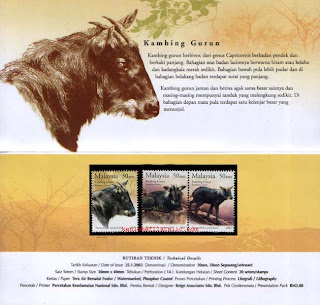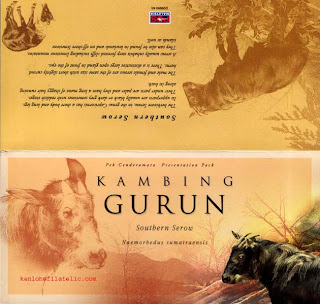Southern Serow - Naemorbedus Sumatraensis Stamp
 |
| A great animal stamp. |
Related to other herbivores, Serows in the genus Capricornis have relatively short bodies and long legs. The upperparts of their bodies are usually black or dark grey sometimes with reddish tinges. Their under parts are paler. A long shaggy mane of hair runs along their backs.
Both sexes of the serow are similar in size with short slightly curved horns. There is a distinctive large open gland in front of each of their eyes.
Both sexes of the serow are similar in size with short slightly curved horns. There is a distinctive large open gland in front of each of their eyes.
The serow mainly inhibits steep forested cliffs including limestone mountains. They can also be found in lowlands and on off-shore limestone islands as well. Serows will come out to feed in more open areas in the early morning and late evening. The serow will eat almost all vegetation.
Mainly solitary, serows come together only to mate. One or usually two young are born after a gestation period of 7-8 months. The young may stay with the mother for up to a year. The serows' territory spans from India to southern China. This includes most of the mainland in South-East Asia and Sumatra. It is believe that serows have great healing properties. This is the reason they are hunted till today. Their numbers in the wild have decreased and today, serows are totally protected under the Protection of Wildlife Act.
Mainly solitary, serows come together only to mate. One or usually two young are born after a gestation period of 7-8 months. The young may stay with the mother for up to a year. The serows' territory spans from India to southern China. This includes most of the mainland in South-East Asia and Sumatra. It is believe that serows have great healing properties. This is the reason they are hunted till today. Their numbers in the wild have decreased and today, serows are totally protected under the Protection of Wildlife Act.












No comments:
Post a Comment